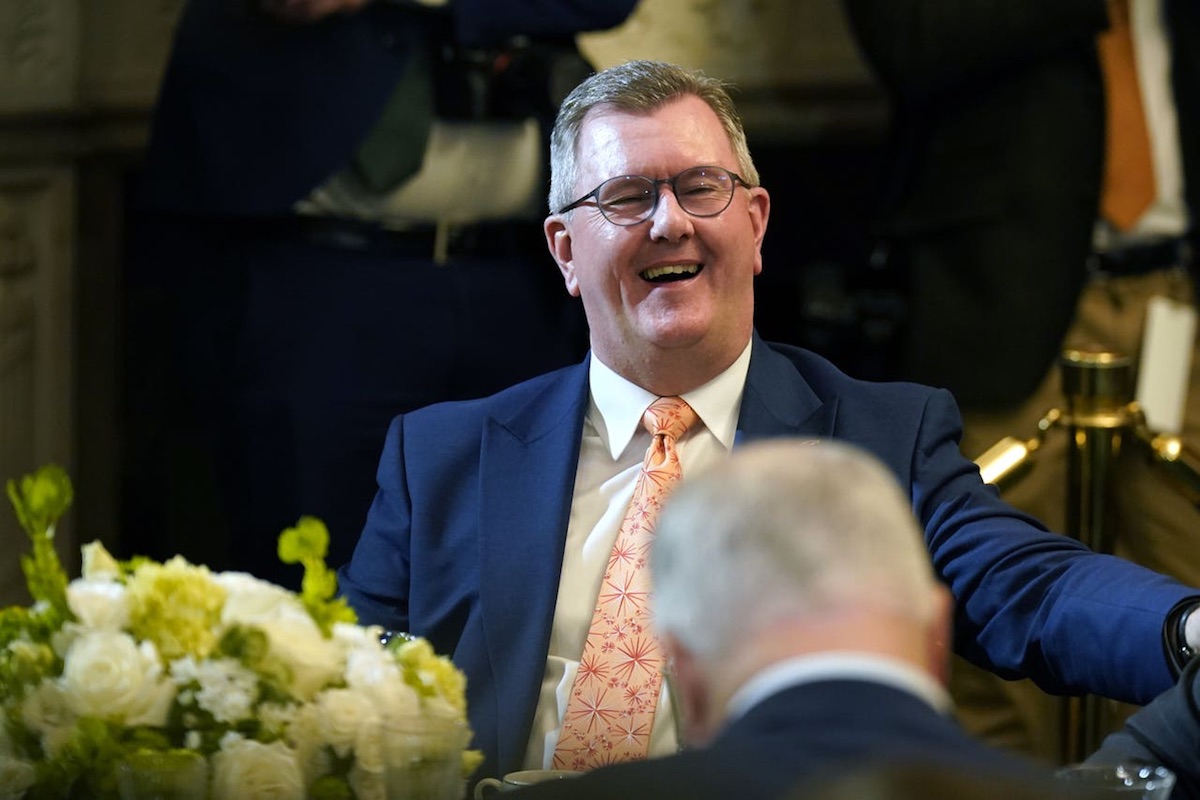
The DUP continue to defy the EU, the US government, their own government in London and their own voters, as overwhelming support for a renegotiated Irish Protocol of Brexit left them with no excuse for not ending their boycott of powersharing in Belfast.
The latest attempt to satisfy insatiable unionist demands, the ‘Windsor Framework’, was approved by EU member states on Tuesday, and its key new veto mechanism was passed by the House of Commons by 515 votes to 29.
The ‘Stormont Brake’, which allows the Belfast Assembly to interdict new EU legislation, won the clear support of British MPs but was opposed by the DUP and a rump of supporters of disgraced former Prime Minister Boris Johnson, who had planned to use the issue as a springboard for a return to frontline politics.
The threat of a trade war between Britain and the EU and a remilitarised border through Ireland looks set to recede further on Friday, when the deal is adopted into EU law.
Despite assurances that 97% of EU law has now been disapplied from the north of Ireland, and the creation of a ‘green lane’ for unrestricted trade across the Irish Sea, DUP MPs demanded “clarification” and “reworking” of the complex details of the Framework deal. They also suggested that a continuing check on the importation of certain species of non-herbaceous plants was evidence of a continuing ‘Irish Sea Border’.
Tolerance for the DUP’s infamous intransigence may have run out last week after the party angrily lashed out at senior US political figures over their support for a return of powersharing ahead of the 25th anniversary of the Good Friday peace agreement.
In a significant gaffe, DUP leader Jeffrey Donaldson resorted to telling powerful US Senate leader Chuck Schumer to ‘read a book’ on Ireland after he said he would not support a new trade deal with Britain if the Good Friday Agreement is undermined.
In a TV interview, Donaldson responded: “I would urge the senator to read some history books. Maybe he’d learn a little bit more about what really happens and the reality of the situation.”
US President Joe Biden, who also voiced strong support for the new Brexit deal, is among those set to visit Ireland next month to mark the deal that established powersharing and the Stormont Assembly.
But despite the conclusive outcome of the vote at Westminster, and an opinion poll showing almost four in five of the party’s own voters disagreeing with its hardline position, the DUP is still seeking unilateral British changes to the Windsor Framework. That could lead to a new cycle of backsliding, collapse and renegotiation.
“Clearly we will continue to assess any change that is made to the proposed arrangements, including through legislation that will come forward in Parliament,” Donaldson said, ahead of Wednesday’s vote. “Of course we’ll then take a view as to what progress has been made and if that progress is sufficient to enable the institutions to be restored.”
DUP MP Ian Paisley insisted after the vote that further concessions could still be forthcoming, but there is a growing consensus that Brexit renegotiations are finally at an end. Barring a humiliating climbdown, the DUP is not expected to end its boycott ahead of local elections in May.
However, the continuing absence of a Stormont executive may open a pathway for moves towards joint authority and the setting of a date for a referendum on Irish reunification.
Ulster Unionist Party leader Doug Beattie warned their unionist rivals that the London government is “moving on and.. the DUP boycott has failed”.
“Unionism has a decision to make,” he said. “Do we want to have influence via the Assembly and Executive or do we want to be nothing more than passengers with no say over the direction we are headed?”
In the wake of Wednesday’s vote, Sinn Féin First Minister-elect Michelle O’Neill called again for an end to the DUP boycott of Stormont and for the executive to be immediately restored.
“The onus is on the British and Irish governments and all parties – not least the DUP – to now get Stormont moving,” she said.
“It’s time to move forward. We need to see the assembly and executive working now to address the problems in our health service and deliver for business, for workers and families.”
“Our people and our economy can’t wait,” she added. “The public have been punished for long enough by this futile and shameful DUP blockade.”
Aontú leader Peadar Tóibín has urged the London and Dublin governments to reconstitute the Executive “with or without” the DUP.
“A Good Friday Agreement anniversary celebration without the institutions of the Good Friday Agreement would be a hollow affair,” he said.
“There is no functioning Stormont, no Executive, no North-South Ministerial Council, no democratic accountability and no mechanism to fix the severe cost of living crisis or the decimation in the public services”.
He said the London and Dublin governments had “failed miserably” in guaranteeing its function.
“There is a serious cost to the people for this failure. Are we going to see pomp and pageantry of anniversary celebration together with a US Presidential cavalcade but still no functioning democracy?”
Some unionist hardliners have showed signs of moving on.
Loyalist blogger Jamie Bryson, one of those blamed for fuelling unionist extremism in recent years, predicted the unamended ‘Stormont Brake’ could still be used by the DUP to cause political turmoil at the Belfast Assembly, predicting “a guerrilla war to halt all new EU law”.
Bizarrely, DUP MP Jim Shannon put down a Westminster motion to mark the 50th anniversary of the Dolly Parton song, “I Will Always Love You”.
Unionist commentator Alex Kane predicted the DUP would ultimately opt for “a softish landing – neither a hard no nor a hard yes. That will still be a hard sell because it involves trying to placate polar opposites across unionism and loyalism.”
![[Irish Republican News]](https://republican-news.org/graphics/title_gifs/rn.gif)
![[Irish Republican News]](https://republican-news.org/graphics/title_gifs/harp.gif)

